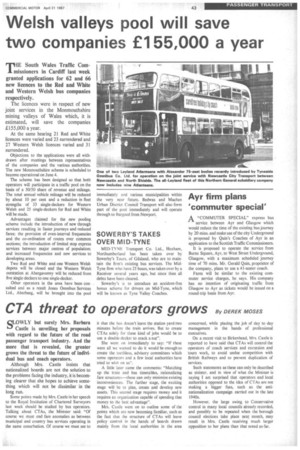CTA threat to operators grows By DEREK MOSES QLOWLY but
Page 45

If you've noticed an error in this article please click here to report it so we can fix it.
surely Mrs. Barbara 1.-7 Castle is unveiling her proposals with regard to the future of the road passenger transport industry. And the more that is revealed, the greater grows the threat to the future of individual bus and coach operators.
Although Mrs. Castle insists that nationalized boards are not the solution to the problems facing the industry, it is becoming clearer that she hopes to achieve something which will not be dissimilar in the long run.
Some points made by Mrs. Castle in her speech to the Royal Institution of Chartered Surveyors last week should be studied by bus operators. Talking about CTAs, the Minister said: "OF course we must end fare anomalies as between municipal and country bus services operating in the same conurbation. Of course we must see to it that the bus doesn't leave the station yard two minutes before the train arrives. But to create CTAs solely for these kind of jobs would be to use a double-decker to crack a nut".
She went on immediately to say: "If these were all we wanted to do it would be enough to create the toothless, advisory committees which some operators and a few local authorities have tried to wish on us".
A little later came the comments: "Matching up the train and bus timetables, rationalizing fare structures—these can only minimize existing inconveniences. The further stage, the exciting stage will be to plan, create and develop new assets. This second stage requires money and it requires an organization capable of spending that money to the best advantage".
Mrs. Castle went on to outline some of the points which are now becoming familiar, such as the fact that the structure of CTAs will leave policy control in the hands of boards drawn mainly from the local authorities in the area concerned, while placing the job of day to day management in the hands of professional executives.
On a recent visit to Birkenhead, Mrs. Castle is reported to have said that CTAs will control the operators of coach services and excursion and tours work, to avoid undue competition with British Railways and to prevent duplication of services.
Such statements as these can only be described as sinister, and in view of what the Minister is saying I am surprised that operators and local authorities opposed to the idea of CTAs are not making a bigger fuss, such as the antinationalization campaign carried out in the late 1940s.
However, the large swing to Conservative control in many local councils already recorded, and possibly to be repeated when the borough council elections take place next month, may result in Mrs. Castle receiving much larger opposition to her plans than that noted so far.




































































































































